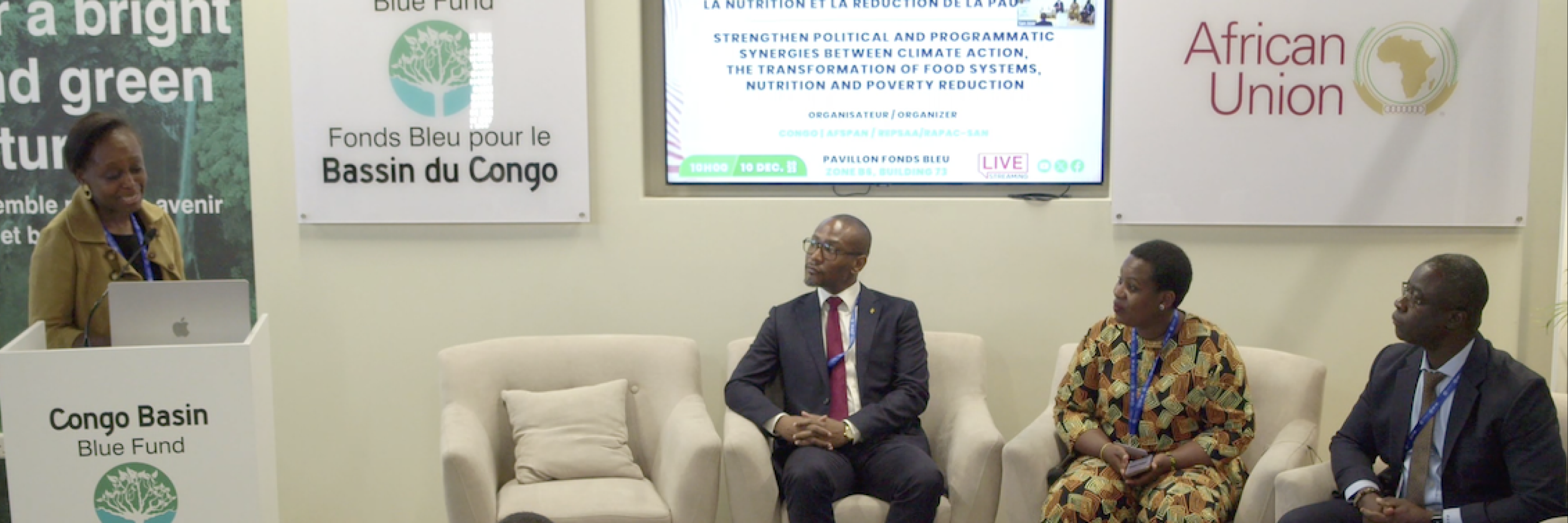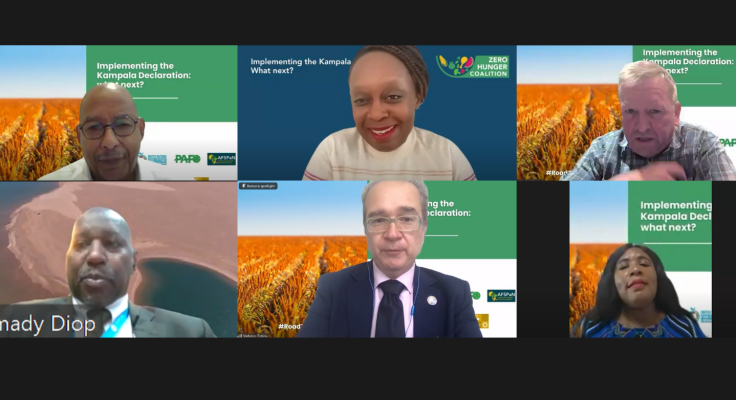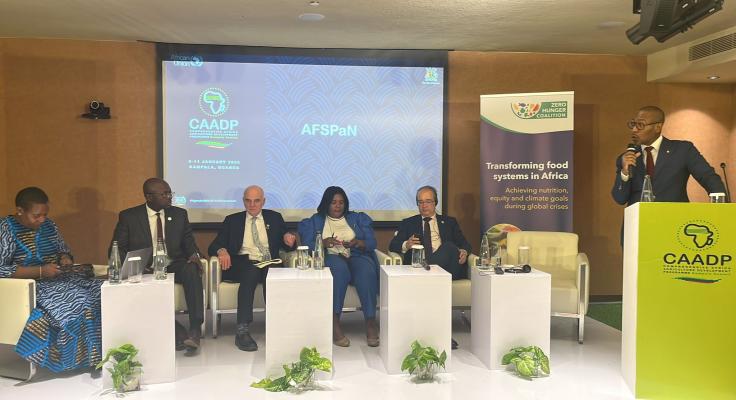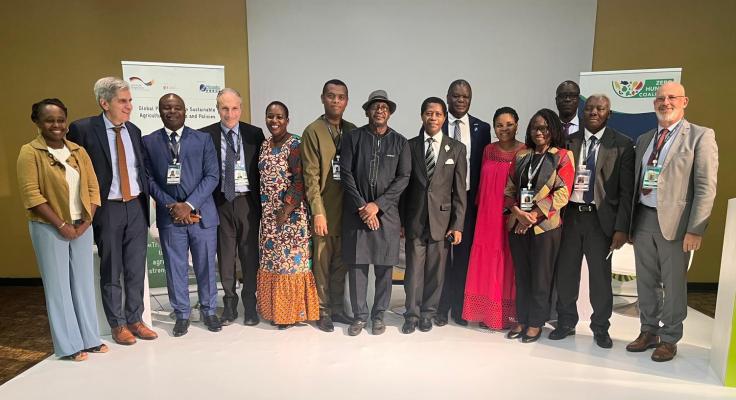
Bringing together the agendas for climate action & food system transformation
Climate action and food system transformation are inextricably linked. As a perpetrator and victim of climate change, food systems need to simultaneously address climate impact and resilience.
During COP 28, the Zero Hunger Coalition co-organized an event, A Prioritization of Policy and Programmatic Options: What are the actionable points of synergy between Agri-food Systems Transformation, Nutrition, Poverty Reduction and Climate Action?, which brought together African parliamentarians and representatives from regional and international organizations, to explore synergies and partnerships to address the multiple and complex issues that link food systems and climate in Africa.
Moderated by the Shamba Centre’s Co-founder and Director of Partnerships, Francine Picard, the event started with a sobering assessment: 734 million people remain food insecure worldwide and no headway has been made to limit global warming to 1.5C as agreed in the Paris Accords.
Unlocking solutions
Stefanos Fotiou, Director of the UN Food Systems Coordination Hub, highlighted the call by the UN Secretary General to build synergies between the climate action and food systems transformation agendas. Following up on this mandate, the Food Systems Hub launched the Convergence initiative, together with the COP Presidency and the 4SD Foundation. “In two years we want to raise the ambition of the National Determined Contributions (NDCs) to include food systems. We would like to bring the processes for COP 30 and the Food Systems Summit Stocktaking together in 2025,” he noted.
As Stefanos pointed out, dialogue in many countries already exists. However technical support is needed in areas such as monitoring, evaluation, data and science-based evidence gathering. Regional bodies, such as the Congo Basin Commission, have an important role in building political momentum and support. Cross-stakeholder collaboration will be essential. He called on parliamentarians to push for the necessary legislation to “operationalize the idea of food systems and climate action going together.”
David Laborde, Director of the Agrifood Economics Division at the FAO as well as a Co-chair of Hesat2030, recognized the colossal effort need for sustainable food system transformation at a time of scarce resources and limited budgets. Convincing policy-makers of what is needed will require the “knowledge of what works, including examples from other parts of the world, but rooted in local conditions.”
For David, policies and finance require data to convince and then to implement. Through the Evidence-based and costed roadmaps developed by the Zero Hunger Coalition, “knowledge is translated into evidence that can then lead to action,” he remarked. However, David noted that policy implementation will depend not only on the national context but also the regional context. For this reason, regional coordination is essential.
HE Honoré Tabuna, Commissioner for Environment, Natural Resources, Agriculture and Rural Development, representing the Economic Community of Central African States, affirmed his confidence in the potential of Africa. “We have the foundations for agro-ecology such as the necessary the land and rainwater. We have the smallholder farmers, an industrial base and a growing population which will reach 400 million consumers by 2050,” he noted.
However, the continent faces many problems. According to Honoré, “We are importing 80% of our food products. There is a lack of finance, production efficiency and available infrastructure. There is immediate urgency, and we need to convert these problems into policy issues. Let’s start with the smallholder farmers and work with those who are already present.”
Bringing in political leadership
During COP 28, the Presidency brought food system transformation to the forefront with its Emirates Declaration on Resilient Food Systems, Sustainable Agriculture and Climate Action,. As signatories, 158 countries agreed to align their national food systems and agricultural policies with their Nationally Determined Contributions (NDCs) and National Adaptation Plans (NAPs) by 2025
With the recognition of the importance of food systems, an important step has been taken. But, as the Hon Neema Lungagira, member of Parliament from Tanzania and a member of the African Food System Parliamentary Network (AFSPaN), noted, “As many Africans know, food security does not mean nutrition security. Investments in climate change also require investing in nutritious meals. For many years, the issues surrounding climate have focused on the environment and left out food and nutrition. It is really good to see the progress that has been made now that nutrition is more prominently recognized as part of the climate discussion.”
The Hon. Jasaw Godfred, member of Parliament from Ghana and a member of AFSPaN has been pleased to see the food system transformation included in the COP 28 agenda. “Because of climate change, food production systems are increasingly disrupted and policy responses to these new developments need to keep pace with the change,” he noted.
Responses will differ between countries in response to the changing situation. For Jasaw, the members of AFSPaN are in a unique position to take action by influencing budgets and pushing for policy actions that promote and support food system transformation.
However, he noted the policy incoherence in many countries and the need for a more integrated approach to crisis. “We also need to break the barriers of trade. Food needs to be made available where it is needed within and across countries. This is something that parliamentarians need to think about,” he concluded.
Focusing on finance
According to a recent survey, smallholder farmers worldwide are spending US$368 billion annually in efforts to adapt to climate change. This amount vastly surpasses the US$ 57 billion raised during COP 28 of which US$ 7 billion is specifically earmarked for food systems.
For the Hon. Jeremy Lissouba, member of Parliament from the Republic of Congo and a member of AFSPaN, finance is at the core of the solutions. The gap between the investments made by smallholder farmers and the global community highlights the extent to which their needs are not being met.
“We need to make better uses of the resources available and ensure that we can have a multiplier effect. What are the best policies and what actionable steps can we take? We need to open the door to financial opportunities and make sure that we provide the necessary conditions for private lenders,” he noted.
Final thoughts
The new Chair of the Zero Hunger Coalition, Ibrahim Mayaki, ended the session by applauding the commitment by African parliamentarians to address the issues of food system transformation and climate action. “They have showed a clear understanding of these issues and what needs to be done to make the necessary changes,” he remarked.
To succeed, Ibrahim recommended a focus on three elements. First, a focus on evidence and data to guide policy decisions which should be further bolstered by feedback from smallholder farmers and other stakeholders. Second, coordinated efforts on implementation with stakeholders using the same language and narrative. And third, the strong leadership to make change happen.
Ibrahim called for a human-centred approach for food system transformation that focuses on smallholder farmers. “They provide 80% of food production and make up 20-40% of the national GDP. We need to make sure that they receive government resources for climate adaptation and that they are empowered. We need to reverse the current situation,” he concluded.
The event took place with the support of the Congo Basin Climate Commission. It can be viewed online on YouTube and Facebook.



